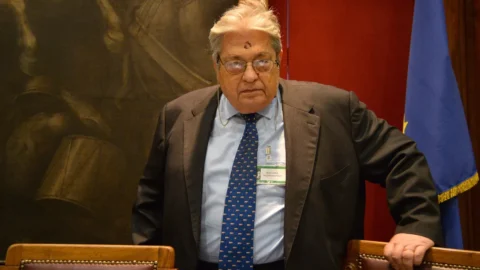He is right Franco Locatelli When, in his speech on Sunday 6 January, takes up and effectively argues Monti's request to "marginalize", politically speaking we mean both fassina is Brunetta, given that these are the two extreme poles of a political thought, common to the populist right and the non-reformist left, which considers the binomial "rigor - reforms" which inspired Monti to be wrong and which contrasts it with "more taxes for rich people and more public spending” (Fassina) and “less taxes for all and more liberalisations” (Brunetta), almost as if Italy today was like the America of Obama and Romney a few months ago. With all due respect to the two illustrious personalities, Italy's problem today is not this, but that of implementing an organic policy of economic, social and institutional reforms which, combined with rigorous control of public spending, free up the necessary resources to development. It is a question of whether or not the Pd and Pdl are up to this task.
Personally I find it misleading to use Fassina and Vendola as "human shields" to claim that the Democratic Party is not. Both of them don't seem to me to have the political weight and cultural consistency to prevent the Democratic Party, if Bersani really wanted it, from acting as a reforming force. The real obstacle to moving in this direction for Bersani comes, if anything, from Cgil of Camusso, From Fiom by Landini and from the many trade unions and trade associations that refer to the Democratic Party and, above all, it comes from a widespread anti-reformist and conservative culture that still permeates the Democratic Party. This party lacked the political and cultural courage (except perhaps Veltroni's brief parenthesis) to make a clear break with its past, I'm not saying how the SPD did in Bad Godesberg when it repudiated Marxism, but, at least, how it did Schroder when he got rid of Lafontaine (former finance minister and much more important personality than Vendola and Fassina) to ally with Merkel, thus laying the foundations for the German economic revival.
The confirmation of this substantial political and cultural continuity also comes from the composition of the lists where, alongside illustrious independents (but we must not forget that the PCI also lined up prestigious ones, from Guido Rossi to Luigi Spaventa), in reality a dense group dominates of faithful. The problem, therefore, is not whether Fassina or Vendola will prevent the Democratic Party from acting as a great reforming force but whether the majority of this party, the one that refers to Bersani, will and will really be able to behave as such. We all hope so, but it is far from obvious. However, there will be plenty of opportunities to demonstrate this ability. If we really want to meet the commitments undertaken with Europe in terms of expenditure and budgetary constraints, as we solemnly declared our intention to do, but at the same time we do not want to remain prisoners of the austerity policy alone, we must have the courage to make reforms.
Starting with that of the institutional and political system to that of the organization of the State and the Public Administration (the spending review alone is no longer enough), from that of the school and university up to that of the labor market, which needs to be completed if anything but certainly not weakened. These are all issues that are already on the table today. What does the Democratic Party plan to do? To carry them forward or to curb them, as your social and cultural block of reference has done in all these years? This seems to me to be the real question. Bill Emmont (the former director of the Economist), in an article of substantial support for Bersani which appeared in the Turin press, some time ago posed exactly this problem to the secretary of the Democratic Party and in particular asked whether, considering the fact that the destructuring of the school and the dequalification of Italian universities are mainly the responsibility of the left, if it does not think it is time to turn the page and to aim for the reform on merit (for students) and quality (for teachers).
Good question, to which Bersani he was unable to answer because, to do so, he would have had to renege on the words of support and encouragement that his party has always and in any case given to any movement of students and teachers taking the field, from the time of the Panther until today, against the school reform, whoever was proposing it. The truth is that over the years a vast and articulated conservative block has been created in Italy, completely transversal to the right and the left, which has successfully opposed any reform that threatened its interests and which today represents the main obstacle to growth.
It is a block to whose creation, more than Fassina or Vendola, Cofferati, Epifani and Camusso contributed strongly. Just as public administrators, men of culture, magistrates and journalists have contributed. It is this block that must be defeated if the way is to be paved for reforms. For this Monti is right when he points out that, rather than between centre-right and centre-left, today one must choose between reformists and conservatives. If the Reformists, wherever they are located, will be able to come together and form a common front, then perhaps Italy will be able to grow again.





